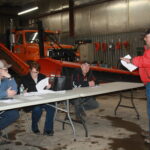History of the Micmacs:
Transition from winter to spring
By John Dennis
With the coming of the warmth of the sun, the fresh grass, the awakening of the hibernating animals and the longer days, the Micmac people, prior to European contact, were one of the peoples who understood how difficult it was to survive the long, cold winter season.
This is the reason the Micmac people celebrated the first days of spring; it meant that they had survived the many moons (months) of harsh winter.
The Micmac people would celebrate by having a feast, which is still done today whenever we gather for such occasions or celebrations of our cultural. They would assist the families who experienced difficulty within the past winter months to help them get through with food, hunting supplies, clothing and with any other utilitarian tools that was required in order to survive. The men would assist the family with animal meat they had hunted and whatever tools that were required to assist in the hunt. The women would assist the family in what they had made (clothes, tools, basketry for gathering foods and plants, etc.).
The winter months were one of the seasons that were difficult to get through, but through helping each other out, the Micmac people would see that the other families received whatever care that was required of them.
The first sign of spring was a huge reason to celebrate the upcoming season, it was a start of a new year, fishing, hunting and gathering food and supplies for the upcoming moons (months). The ice would start to melt, which meant that it was time to put aside the snowshoes and toboggans for the season and to start fixing their summer tools and transportation (canoe).
The upcoming months, that lead up to the summer season meant that it was time to move from the winter encampment (inland) onto the summer encampment, which was located by the coast. The reason for the move was beneficial for the survival of the people, but also beneficial to the surrounding environment (plants, animals, etc.). The women would gather birch bark for their wigwam for usage on the summer camp, which was easier than cutting the birch bark from other trees.
The children of the village would assist the women in many ways, as was a custom of our people; they would later learn how to not only respect women, but also the many ways that the women benefited the tribe.
The work of the men was very dangerous during those times with attacks from wild animals, warring villages or other dangerous encounters, the men were constantly on guard. The men of the tribe or village would hunt some animals for the next journey that was to take place, the summer encampment. These are some of the customs of our people long ago.
John Dennis is the cultural/community development director for the Aroostook Band of Micmacs.







